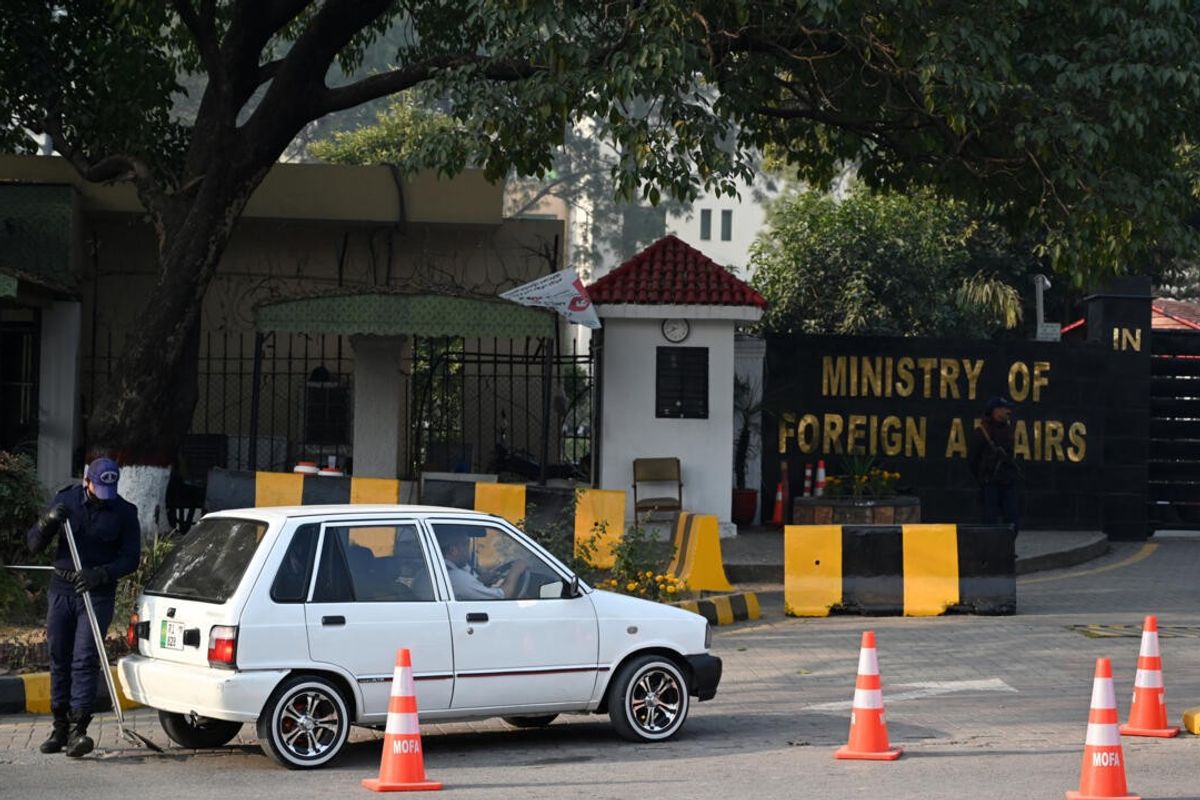Pakistan condemns Israeli strikes on Iran, warns of grave regional fallout
Islamabad says Israeli attacks violate Iran's sovereignty, urges UN to hold Israel accountable for aggression

A Pakistani police officer checks a vehicle stand entering the Ministry of Foreign Affairs in Islamabad on January 18, 2024.
AFP
Pakistan strongly condemned on Friday what it called Israel’s “unjustified and illegitimate aggression” against Iran, denouncing the overnight air strikes as a violation of international law and a threat to regional peace.
The Pakistani Foreign Ministry issued a statement condemning the Israeli attacks, which targeted Iranian nuclear facilities, ballistic missile factories and senior military officials, including top commanders of Iran’s elite Revolutionary Guards.
“These military strikes violate the sovereignty and territorial integrity of the Islamic Republic of Iran and clearly contravene the U.N. Charter and fundamental principles of international law,” the statement said.
Pakistan emphasized that Iran has the right to self-defense under Article 51 of the U.N. Charter, and urged the international community to intervene.
“The international community and the United Nations bear responsibility to uphold international law, stop this aggression immediately and hold the aggressor accountable for its actions,” the statement added.
Prime Minister Shehbaz Sharif also condemned the attack. "I condemn, in the strongest possible terms, today's unprovoked attack on Iran by Israel. I convey my deepest sympathies to the Iranian people on the loss of lives in this attack. This grave and highly irresponsible act is deeply alarming and risks further de-stabilizing an already volatile region," he wrote on his official X handle.
"We urge the international community and the United Nations to take urgent steps to prevent any further escalation that could imperil regional and global peace."
Pakistan’s reaction came hours after Israel launched a wide-ranging military operation dubbed “Operation Rising Lion,” which Israeli officials said was aimed at preventing Iran from building a nuclear weapon.
More than 200 Israeli fighter jets took part in coordinated air strikes across Iran, Israeli military spokesman Brig. Gen. Effie Defrin said. He claimed over 100 strategic targets were hit, including sites related to Iran’s nuclear program and missile development.
Iranian media reported explosions near several key military and nuclear sites, including the uranium enrichment facility in Natanz. The International Atomic Energy Agency said it was monitoring the situation and had not detected increased radiation.
Iran's Revolutionary Guards confirmed that their top commander, Hossein Salami, was killed in the strikes. State media also reported the deaths of at least six nuclear scientists and several civilians, including children, in Tehran.
Iran's Supreme Leader Ayatollah Ali Khamenei condemned the Israeli operation as a “wicked and bloody crime” and warned that Israel would face “a bitter fate.”
In Islamabad, officials voiced concern over the wider implications of the escalating conflict.
“These blatant provocations constitute a grave danger and a serious threat to the peace, security and stability of the entire region and beyond,” Pakistan’s Foreign Ministry said.
The attack caused ripple effects across the Middle East. Iran closed its airspace and Tel Aviv’s Ben Gurion Airport was shut until further notice. Airlines began diverting or canceling flights across Israel, Iran, Iraq and Jordan, according to aviation tracking data.
Oil prices surged globally amid fears of broader conflict. Brent crude jumped more than 7%, hitting its highest level since early April.
In Washington, President Donald Trump said the U.S. had no part in Israel’s operation and repeated that Iran must not be allowed to build a nuclear bomb. However, an Israeli official told public broadcaster Kan that Israel had coordinated the operation with the United States.
U.S. Secretary of State Marco Rubio denied involvement and said Israel had acted unilaterally in self-defense. “Let me be clear: Iran should not target U.S. interests or personnel,” Rubio said.
Iran accused the United States of backing the attack and warned both countries would “pay a heavy price.” Despite the tensions, U.S. and Iranian officials were still expected to meet for nuclear talks in Oman on Sunday.
Iran’s government defended its right to pursue nuclear technology, calling the Israeli attack cowardly and a reason to maintain its enrichment program and missile capabilities.
Pakistan, a close neighbor of Iran and a country that has often called for restraint in Middle Eastern conflicts, stopped short of announcing any formal diplomatic moves but urged “all parties to exercise utmost restraint.”
The statement reiterated Islamabad’s support for Iran and stressed the need for diplomatic solutions to regional disputes.
“Pakistan stands in resolute solidarity with the people of Iran,” the Foreign Ministry said.










Comments
See what people are discussing